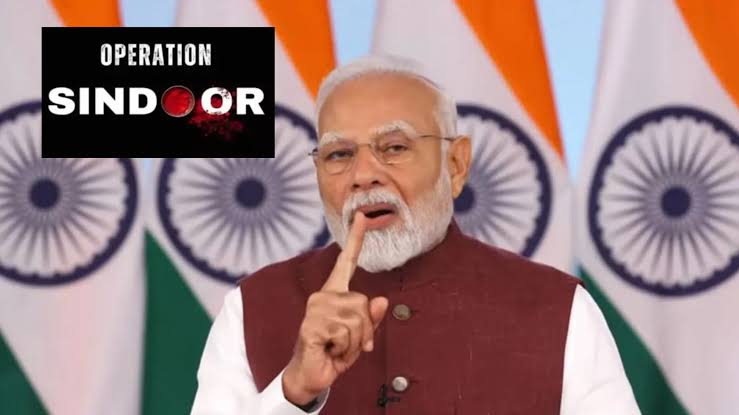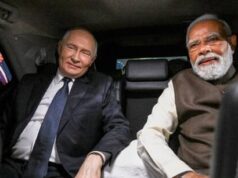Operation Sindoor not yet over, it is now India’s established policy against terrorism – Indian High Commissioner

By Jamila Husain
We have clearly conveyed that India will not be subjected to nuclear blackmail and would not allow terrorism to be perpetrated under this cover by the Pakistani establishment.
Terrorism is a global scourge and all countries must act together to deal with it. It is also noteworthy that when Sri Lanka suffered from the Easter terror attacks, Prime Minister Modi was only global leader who visited Sri Lanka to express India’s solidarity with the victims of the attack.
In an interview with the
Daily Mirror in the wake of tension between India and Pakistan, Indian High Commissioner Santosh Jha warned that India would not treat another terror attack as a law-and-order issue, but as an act of war. His comments were a clear signal that New Delhi’s tolerance for cross-border terrorism has ended. He said that ‘Operation Sindoor’ is the established policy of India
against terrorism
Q High Commissioner, could you tell us the reasons why India launched the recent military operation against Pakistan, called the ‘Operation Sindoor’? Was it solely in response to Pahalgam attack? There have been many terrorist attacks in India earlier. Could you explain why India responded the way it did?
On 22 April, Pakistani and Pakistan-trained terrorists belonging to the Lashkar-e-Taiba (LeT) murdered 26 tourists, 25 Indians and one from Nepal, in Pahalgam, Jammu & Kashmir, India. The victims were innocent tourists. Men were targeted, profiled on communal lines and shot at close range in front of their wives and children in one of the most barbaric and brutal terrorist attacks in history.
This was the biggest terrorist attack on civilians in India since the 26th November 2008 attacks in Mumbai. It should not be seen as just another terrorist attack in Kashmir. It was an attack not only on innocent civilians, but on the very essence of our country, its secular fabric and its developmental trajectory. The attack was aimed at spreading communal discord and to disrupt the sense of normalcy that had returned to the Union Territory of Jammu & Kashmir as reflected in the fact that over 23 million tourists had visited this most beautiful part of India in 2024. We also had intelligence reports that many more such attacks were on anvil.
We responded initially through a set of diplomatic measures announced on 23 April including to hold the Indus Waters Treaty in abeyance, and suspending cross-border mobility and trade, amongst others.
As Pakistan took no demonstrable steps against the terrorist infrastructure it so proudly harbours, India launched “Operations Sindoor” on May 7 launching focused strikes on nine terror bases in Pakistan and Pakistan Occupied Kashmir (PoK). These included headquarters of UN proscribed terror organisations, including the Jaish e Mohammad (JeM) and the Lashkar e Taiba (LeT) in Bahawalpur and Muridke respectively. Altogether more than 100 terrorists were eliminated at these global universities of terror.
India had targeted only the terrorist strongholds and carefully ensured that military and civilians were not targeted. Our response was non-escalatory, measured, and
proportionate. The same was communicated to the Pakistani side, with the clear intention not to escalate the hostilities.
Instead of cooperating to wipe out terrorist hideouts, unfortunately Pakistan chose to side with the terrorists and attacked India the next evening – targeting Indian military facilities, schools, colleges, places of worship and homes. India was then forced to respond in equal measure but it was still proportionate and limited to Pakistani military facilities. Pakistan’s continued escalatory posture led India to respond on May 10 by targeting Pakistani military installations causing significant damage to 13 of their airbases. This substantial and definitive damage to Pakistan’s military infrastructure, forced Pakistan to reach out to India and consequently both sides reached an understanding to stop hostilities.
Our message has been loud and clear. We do not see any distinction between Pakistan’s establishment and Pakistan sponsored terrorists attacking India. Through our response, we have clearly conveyed that India will not be subjected to nuclear blackmail and would not allow terrorism to be perpetrated under this cover by the Pakistani establishment. Prime Minister has declared that in future any terrorist attack on India from Pakistan will be regarded as an act of war by Pakistan on India and will be responded to accordingly.
Q Following the Pahalgam attack, India accused that Pakistan is backing the terrorists. How did you arrive at that conclusion?
Right after the Pahalgam attack, a terrorist group named The Resistance Front (TRF), which is known to be a front for the Lashkar-e-Taiba (LeT), claimed responsibility for the attack. Investigations after the attack, pointed to clear connections with Pakistani establishment. It clearly revealed that the communication nodes of terrorists were in and to Pakistan. Identification of the attackers, based on eyewitness accounts and electronic intercepts clearly indicate to connections leading to the army in Pakistan.
Recently, Pakistan’s Defence Minister Khwaja Asif has admitted in an interview to Sky News that Pakistan has funded and supported terrorists for many decades. This has been corroborated by Pakistan’s former Foreign Minister, Bilawal Bhutto. Pakistani Army Chief Asim Munir and known terrorist organizations in Pakistan, too, indulged in blatant communal rhetoric calling for violent intervention in Kashmir just days prior to the Pahalgam attack. Such deplorable exhortations led to the attack carried out in Pahalgam.
The nature of the attack, religious profiling, and location of the attack, all align with Asim Munir’s call for violence in Kashmir. It is well known that terrorists nurtured and supported by Pakistan act on behalf of Pakistan and vice-versa. Visuals of brazen participation of senior Pakistan military leaders in the funeral of slain internationally recognised terrorists, which were held with State honours, clearly indicates that these proscribed elements are openly courted and supported by Pakistan.
Q In the wake of the Pahalgam terrorist attack, President Anura Kumara Dissanayake expressed solidarity. What are your thoughts on this?
India is thankful to Sri Lanka and President Anura Kumara Dissanayake for expressing solidarity with the victims of the Pahalgam terror attacks and condemning terrorism in the strongest terms.
President also spoke to Prime Minister of India to convey these sentiments immediately after the terrorist attacks in Pahalgam. As a country which has recently faced the devastating consequences of terrorism, Sri Lanka understands the pain and destruction it causes to communities, societies and their economies.
Terrorism is a global scourge and all countries must act together to deal with it. It is also noteworthy that when Sri Lanka suffered from the Easter terror attacks, Prime Minister Modi was only global leader who visited Sri Lanka to express India’s solidarity with the victims of the attack.
India has held in abeyance the Indus Water Treaty that provides for water haring with Pakistan. This has raised concerns in some quarters here since Sri Lanka is seeking connectivity with India in the energy sector. If India blocks water which is a basic humanitarian need, what is it about others? How do you allay such concerns?
The two issues are clearly not comparable. Our relations with Pakistan and Sri Lanka are built on different premises. Sri Lanka is a centrepiece of India’s Neighbourhood First policy. Our relations today is marked by unprecedented trust and goodwill at all levels. Not just with Sri Lanka but we have energy connectivity projects with our other neighbours such as Bhutan, Nepal and Bangladesh.
Pakistan on the other hand is a country that has consistently maintained a hostile posture towards India not least through the implementation of terrorism as state policy. Pakistan is globally recognised as an epicentre of terrorism. There has hardly been a terrorist incident in the world in the last three decades without Pakistan’s fingerprint or direct involvement. The largest number of UN proscribed terrorists are either in Pakistan or have received training in Pakistan – Osama Bin Laden, Masood Azhar or Hafiz Saeed, to name a few. When a country is sending terrorists to bleed and kill your citizens, there cannot be normal trade relationship or good-will projects between them.
As far as the Indus Water Treaty is concerned, it was signed with a view to promote friendship and cooperation between India and Pakistan. Decades of terrorism perpetrated by Pakistan on India demonstrates that this good faith has been outrageously violated by Pakistan. Further, ever since the signing of the treaty, Pakistan has continued to wilfully obstruct every effort by India to exercise its legitimate rights under the treaty, including by actively promoting terrorism in Jammu & Kashmir. In addition, the Indus water Treaty was signed in the 1960s.
Since then, fundamental changes to the topology, hydrography, demography etc. of the region warrant changes to the Treaty. Further climate-change and availability of new technologies as well as the imperative of renewable energy underscore the need for a review of the Treaty. For these reasons, India had earlier proposed such a review. However, for the past two years, Pakistan has been stone-walling these requests. Clearly, Pakistan has been in violation of both the spirit and purposes of this Treaty. More important, as Prime Minister Modi has mentioned, blood and water cannot flow together.
Q Pakistan said that six of your war planes including three Rafales were downed. Rafale is one of the most advanced fighter aircrafts you had. Pakistan used a fighter jet manufactured in China to shoot down yours. This is a major setback. What do you feel?
Pakistan has made many preposterous claims during this conflict. Spreading lies and disinformation seems to be embedded in Pakistan’s DNA. Pakistan had made similar claims of having struck the Adampur air base in India. However, the whole world witnessed that this base was unharmed and fully functional when Prime Minister Modi flew into Adampur air base on May 13. Most media reports have also highlighted that Pakistan’s claims regarding inflicting damage on Indian military facilities is part of the falsehood that Pakistan is known for spreading, for decades. This is most visible in its pathological denial of the existence of terrorism infrastructure within its territory.
On the other hand, visual evidence, including satellite imagery of significant damage inflicted on Pakistan’s terrorism infrastructure and its military installations are available publicly. We are also aware that the Indian Air Force bypassed and jammed Pakistani air-defence systems when targeting 13 of its military bases on May 10, irrespective of the origin of such air defence systems. From air defence systems to drones, from counter-UAS capabilities to net-centric warfare platforms, India’s indigenous technology was at the fore-front during Operation Sindoor and it has delivered when it mattered most.
Q US President Trump announced that India and Pakistan have declared a ceasefire and he thus indicated that the ceasefire was mediated by the US Could you explain this ceasefire? Is the military action against Pakistan over? And more importantly, will the ceasefire hold?
Let me clarify that India and Pakistan have reached an understanding through direct bilateral contacts to stop hostilities on land, air and sea. This was through direct engagement between DGMOs of the two sides on May 10. Operation Sindoor is not over; it is now India’s established policy against terrorism. As long as Pakistan maintains tranquility and takes irrevocable steps to abjure terrorism against India, there will be no hostilities. The onus and responsibility for any hostility in the region lies squarely with Pakistan. Any act of terrorism will be seen as an act of war and befitting response will be delivered.
Q Indian Prime Minister Modi in an address recently declared that such military action, like Operation Sindoor is now India’s established policy against terrorism. What are the implications of this strategy? Should Sri Lanka be worried that tensions will flare up again?
Yes, Prime Minister Modi has declared on May 12 that Operation Sindoor is now India’s established policy in the fight against terrorism; it has also established a new benchmark and a new normal in our fight against terrorism. Broadly, there three key elements of this approach.
Firstly, any terrorist attack on India will be met with a befitting response; there will be decisive retaliation on India’s terms. Second, any attempt to use nuclear blackmail as a shield for terrorism will not be accepted by India. India will strike precisely and decisively at the terrorist hideouts developing under the cover of nuclear blackmail. And thirdly, there will be no distinction between terrorists and the government sponsoring terrorism. This new doctrine marks a significant shift in India’s approach to national security and lays the ground for a firm and resolute stance aimed at zero tolerance for terrorism. Further, there will be no talks with Pakistan except regarding they vacating the illegal occupation of POJK or on Pakistan abjuring cross-border terrorism.
Q India is now an ambitious nation. Engagement in war with another country will hamper your path in the realisation of economic, political and international objectives. What are your thoughts?
Please understand that we are not engaged in a war with another country; we are waging a war against terrorism emanating and supported from another country. India seeks peace. India is the land of the Buddha, the epitome of peace. We are indeed focused on peace and prosperity for India and the rest of our region. But, we cannot allow terrorism to flourish with impunity. We cannot ignore when state sponsored terrorists carry out barbaric attacks on our citizens with an aim to destabilize our growth and prosperity. For decades, India acted with restraint against continued and persistent provocation by Pakistan. Unfortunately, despite all efforts, the world, too, has been unable to enforce a change of behaviour from Pakistan. Regrettably, this leaves India with only the military option to deter Pakistan and to safeguard its citizens from terrorism across the border. If Pakistan abjures terrorism directed at India, there will be no need for such actions by India.
Q High Commissioner, what would be the impact of this conflict on Sri Lanka and its economy? Many Sri Lankans were also discussing the security implications of the conflict for our region. How do you intend to cooperate with Sri Lanka in countering terrorism in future under the current regional developments?
Pakistan’s posture, coupled with its internal dynamics and proclivity to use terrorism as a state policy, should be the principal concern for the international community, not India’s counter-terrorism response. The underlying principle of ‘Operation Sindoor’ is zero tolerance for terrorism. Sri Lanka has itself been a victim of terrorism and shares the principle of zero tolerance.
India militarily intervened to destroy terror camps, of course with the objective of delivering justice to the victims of Pahalgam, but also to deter and prevent more such cross-border attacks. The region’s economic stability, especially for countries like Sri Lanka with its mainstay being tourism, is contingent on security after all.
India’s firm and strong counter-terrorism posture is aimed at building long-term peace and stability in the region and serves the larger interest of building peace and prosperity in the entire South Asian region in the long term. As my Prime Minister stated, this is not an era for war, but also not an era for terror.
Daily Mirror




